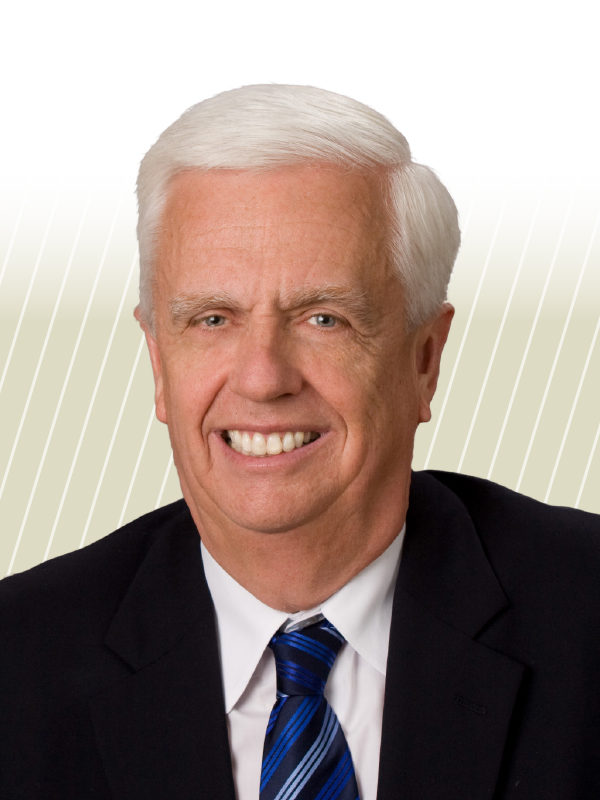When he enrolled at the University of Vermont (UVM) in Burlington as a transfer student, William “Bill” P. Ballard never dreamed that he would stick around the campus for 50 years, first as the manager of family housing, and, for the last couple of decades, as the associate vice president, administrative and facilities services.
Ballard likens his current position to that of a city manager who oversees 10 campus departments, including custodial services, physical plant, risk management and safety, transportation and parking, bookstore, police, university event services, print and mail center, Catcard services, and emergency planning. He credits his long and successful career to “persistence, love of my work, luck, and strong support from an awesome team.”
Vice President for Finance and Treasurer Richard H. Cate, describes Ballard as a “lifelong learner” who has been instrumental in developing financing options for capital improvements, creating new functions and reorganizing existing operations, and leading efforts to implement both the Baldrige Performance Excellence criteria and balanced scorecard in his areas.
Devoted to his job, Ballard admits to few pastimes other than travel, reading, working out with a personal trainer, and spending time with family. “I don’t have great, exciting hobbies. I don’t skydive or bungee jump,” he says.
So, you’re finally ready to retire at the end of the year. Most people retire earlier. Why now?
There’s no magic time to retire, but 70-years-old seems like the best time. I want to work on my timetable and not somebody else’s.
My job, for at least 40 of the last 50 years, has been one where I have been on call 24 hours a day. I’m ready to relax and to go to bed at night without worrying that I will be called at 3 a.m. with a crisis. Although it does happen less frequently these days.
My first job at UVM was managing our newly built married student housing and faculty/staff apartments. Part of being the landlord is getting up when somebody forgets his or her keys. I would wake up, get dressed, and let somebody into his or her apartment.
What are a few highlights of your long career?
I hope history will say that I’ve had a small part in making this great state institution grow in physical size, employees, students, and reputation. My focus has been on providing support services that complement the work of our teaching and research partners.
I’ve been lucky. Very few people have spent the length of time that I’ve spent with one employer. I don’t have any regrets. Working with faculty, staff, and students keeps me young. I particularly have enjoyed my role as faculty adviser to the University of Vermont rescue squad.
How would you describe your management style?
I don’t micromanage. I’ve been successful in supervising an eclectic group of departments by learning a lot about each area, but I don’t get in the middle of people’s work.
My personal vision has been to provide a challenging, satisfying, and fun workplace for employees. I want them to feel respected and appreciated for their efforts and their diversity, and to be empowered to make the greatest contribution that they are capable of making. I encourage them to work by the motto of “See the need, take the lead.”
Can you provide an example of your management style and the advantage it brings?
Rather than asking people to come to my office to meet, I tend to go to their offices.
Most people get a little uptight when they meet with their supervisor, but are more comfortable on their home turfs. Although it takes a little more time for me to travel between meetings, it gives me a chance to better understand what’s going on in various departments. I can say hello to people, and the folks my directors supervise realizethat I have an interest in their departments.
As a certified emergency manager, what advice do you have for business officers on emergency management?
I’m not an advocate for placing that responsibility in law enforcement or security. I believe that emergency management needs to be a separate, stand-alone activity. Our university operates very much like a city. We have our own police department, rescue squad, street and grounds crew, and governance system. It’s important to us, and to the city in which we operate, that we are prepared to function somewhat independently in an emergency.
How can institutions prepare for controversial figures who might visit their campuses?
We have a procedure, as many campuses do, that if events get disrupted by people speaking over the featured guest we follow a script to try and calm things down. There are probably some instances where a campus leader just has to say, “This is not the time or place to have this discussion. We’ll have to resume it in a different setting.”
Higher education is all about stretching people’s thinking and getting students to think outside their traditional box.

You have served on a couple of interesting committees, including the tobacco-free steering committee. What did that entail?
The committee focused on how to move our campus from one that prohibited smoking in buildings, or within 25 feet of a building, to one that prohibited smoking anywhere on property owned and operated by the University of Vermont. A number of other institutions were moving in that direction, based on medical research related to secondhand smoke.
Our committee wanted to develop a concept, test it on the campus with public hearings, talk to constituent groups, and manage the change—moving from a policy that required people to smoke outside of buildings to one where we asked them to go to the perimeter of campus to a public right of way to smoke. The policy has been reasonably effective and encouraged some folks to seek help to stop smoking.
What advice do you have for those who are early in their careers at an institution? What steps should they take to succeed?
Have an area of responsibility that you’re excited about. Act like a sponge and absorb information about your field of interest, as well as the broader field of higher education. For example, although I have never been a chief business officer, I go to the NACUBO and EACUBO annual meetings, and I don’t go to the sessions that relate to what I know. I go to those that relate to what I don’t know. You might find me in the GASB/FASB accounting updates or the tax session.
I encourage people to be global citizens. When I hire new department heads, I look for somebody who isn’t just an expert in his or her field, but someone who is also prepared to be a global citizen.
Tell me something about yourself that readers probably don’t know.
I am something of a Disney fanatic. If you walk into my office, you’ll see all kinds of Disney trivia. I’m looking across the table and see a Mickey Sorcerer hat and a life-size picture of me wearing a Disney Mickey hat with a tassel.
I love all things Disney. Both of our children went to Disney World before they were a year old. My wife is not quite as excited as I am about Disney, but she tolerates it.
You mentioned that you have a family.
Yes. My wife Lynne Ballard is associate provost at Champlain College, also in Burlington. We have two children: a daughter Lindsay, who earned a BS from the University of Vermont, and a son Peter, who graduated with both a BS and an MBA from Champlain College.
After you retire, what will you miss most about your career at the University of Vermont?
Having a role where I feel that I’m making a difference in people’s lives and the campus. I hope I am leaving UVM in better condition than I found it 50 years ago.
MARGO VANOVER PORTER, Locust Grove, Va., covers higher education business issues for Business Officer.



